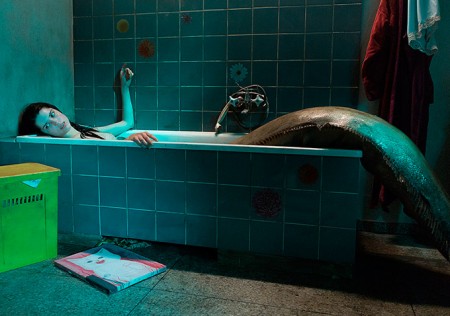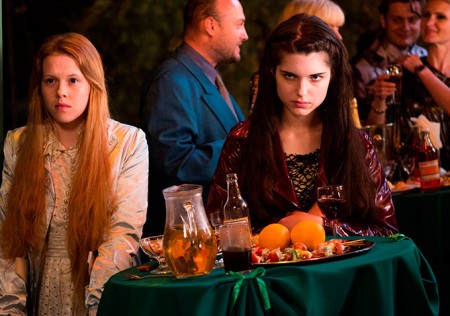-
THE LURE (Agnieszka Smoczynska 2016)
AGNIESZKA SMOCZYNSKA: THE LURE (2016)

Cannibal girlfriend with fins mermaid horror romance nostalgia musical
Hans Christian Andersen's "Little Mermaid" tale can very well be read as the sublimated expression of frustrated gay desire, written when his beloved young friend Edvard Collin decided to get married, leaving him brokenhearted. Andersen spent his life deeply attached to young men he could befriend and adore but never touch - feeling, no doubt, like neither fish nor foul. The little mermaid of his story eventually gives up her amphibian status to be close to the "beautiful young prince" she has adored and saved from drowning. She accepts being permanently made human (but still incompletely so), giving up the mermaid's 300-year life-span, her human legs and feet suffering knife-stab pains as she dances lightly and gracefully (like a ballet dancer pushing her limits). She can only have an immortal soul (which mermaids don't have) if her love object marries her. If he doesn't, she'll turn into foam, the way mermaids do at the end of their long lifespans, and vanish.
Agnieszka Smoczynska's The Lure is a Polish punk musical horror version of Hans Christian Andersen, minus the gayness - but it has plenty of kink, and inter-species frustration. It's centered on a polymorphous nightclub, and meanders quite a bit. But it still winds up pretty faithful to the original tale, after all. It's not clear what the point some of its many surreal, gory variations is, other than just to have some fun and indulge in musical interludes. Smoczynska gives free play to a wild Slavic imagination but at the cost of a bulging midsection that causes the movie's ninety-two minutes to seem like two hours. There are many arresting images, some entertaining songs, dozens of amusing shifts of tone, but not very tight narrative construction. Still, this is a rarity some will adore, though it's decidedly not for children, nor for the mainstream audience.
Forget the mermaid home life. This story begins by the seaside where some guys are playing music and Golden (Michalina Olszańska) and Silver (Marta Mazurek) two sister mermaids, are watching. Silver falls instantly for a pretty, androgynous young blond guitarist (he's usually a bass player) named Mietek (Jakub Gierszal). They wind up auditioning as stripper-singers at an underground nightclub in 1980's Warsaw. (This is a loving if fanciful recreation of a kind of dance-cum-live-music-strip-club cabaret all the rage then that were called "dancings," and the title of this film in Polish means "Daughters of the Dancing.") The script is by Robert Bolesto.
The aquatic sisters grow legs, but when doused with water or submerged grow their big, long slimy salamander-ish fin back. This movie faces head-on the potential (or actual) creepiness of a woman who's half fish - and suggest men's lingering feeling that women are a different, potentially fishy, repellent species. By the way: these mermaids eat human flesh. But they try not to - for a while. (Silver has more motivation not to; Golden gets hungrier and hungrier.) When stripped, and fin-less, it turns out they have no vaginas. They succeed at a backstage audition. They can sing. They don't mind performing naked. They don't hide what they are. In fact, the crowd loves watching them perform in a large glass bowl (a giant champagne glass) providing a full view of their fins. Quite a novelty act! Mietek and his drummer dad (Andrzej Konopka) make up the act, which they dub "The Lure."
Smoczynska, whose first feature this is, seamlessly weaves the tacky and the magical. Exteriors are sometimes blurry with rain, and there is multicolored pastel lighting. Props to production designer Joanna Macha and d.p. Kuba Kijowski for all this. The club too is pastel, and shimmers, but look closely, and it's run down, and the seedy club owner-manager Kierownik sali (Zygmunt Malanowicz) and the other band members are far from glamorous. Mietek likes Silver, but she also creeps him out a bit. They continue a flirtation, and he even dives into a bathtub with her at one point, mussing up his usually impeccable attire. But "To me you’ll always be a fish," he says; "An animal, that is." The music too is neither fish nor foul, an omnivorous mix. It starts with full-on disco, a song-and-dance cover of Donna Summer‘s "I Feel Love" led by the family's frizzy-haired mom vocalist (Kinga Preis). Other performances are rock, or electro, and romantic duets. The band, by the way, has a male sea monster as a member, whose skull is the worse for wear; he has some species-specific advice for Silver.
Golden has been giving in to her desire to feed on local flesh. Between mass production numbers at a department store (with full dance chorus) and scenes of the family's still more cramped Eastern Bloc home with the mermaid sisters moved in, there are news stories coming along of gruesome killings. But Silver persists in adoring Mierek despite his lack of interest, and devises a more radical punishing transformation to please him, that takes us further into horror territory. She is warned what she must do - like what Andersen's "Little Mermaid" must do. And Bolesto and Smoczynska's ending is not so wish-fulfiling as the Danish writer's.
The Lure/Córki dancingum 92 mins., after opening theatrically in Poland at Christmas, debuted at Sundance 2016 World Cinema Dramatic Competition, winning an award for "unique vision and design"; it has since won a number of awards and nominations. US theatrical release by IFC 1 Feb. at IFC Center, NYC; 3 Mar. Laemmle NoHo, LA.

Silver (Marta Mazurek) and Golden (Michalina Olszanska) in The Lure
Last edited by Chris Knipp; 02-01-2017 at 12:21 AM.
 Posting Permissions
Posting Permissions
- You may not post new threads
- You may not post replies
- You may not post attachments
- You may not edit your posts
-
Forum Rules






 Reply With Quote
Reply With Quote
Bookmarks